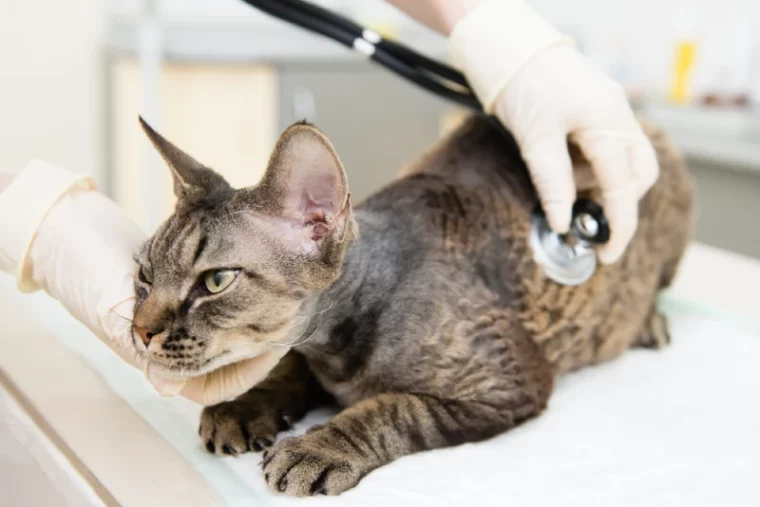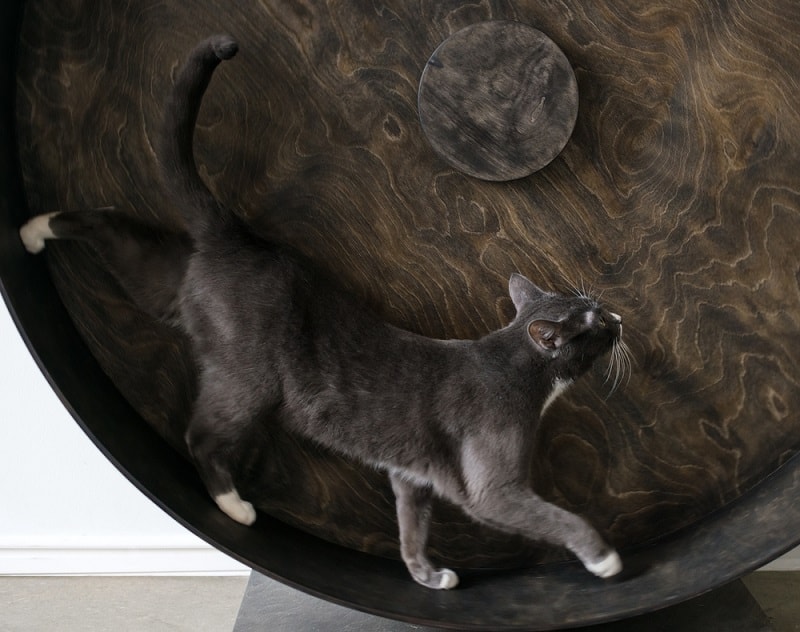
Click to Skip Ahead
If your feline pal experiences only infrequent episodes of constipation, you don’t have to worry too much. Constipation is relatively normal in small animals, and there are many ways you could help them get those bowel movements going. However, if it’s a regular occurrence that usually lasts for more than 48 to 72 hours, contact the vet as soon as possible.
In today’s article, we’ll be looking at some of the signs of constipation in cats, as well as its causes, diagnosis, risks, and more importantly, treatment options. We’ll also be answering some of the commonly asked questions, so read on below if you’d like to learn more.
What Is Constipation?
Constipation is a medical condition that affects the normal digestion process. We often assume that an animal is constipated if the feces can’t seamlessly pass their bowels with a normal frequency.
Peristaltic waves are normally responsible for moving the waste through the digestive tract, but if they aren’t working the way they are supposed to, the system will be pushing down feces at a very slow rate—or not pushing at all. You’ll come to learn that this condition is prevalent among overweight or older cats, as their digestive systems are usually slow.
More often than not, a good number of young and apparently healthy cats that show up at a vet’s office with their owners reporting that they are not pooping or eating are those that inadvertently ingested non-food items. We’re talking about litter, bones, hairs, cloth fiber, etc. While the signs are the same, the causes are different, and these are not considered constipated cats but rather obstructed cats.
Constipated cats are not truly obstructed, as the term refers to the abnormal and delayed defecation that, in this case, cats can still pass feces every couple of days. Their feces are accumulating in the colon without successfully passing them at a normal rate. Because the water is reabsorbed in the colon, feces that remain there longer than normal will become dry and hard, making them more difficult and painful to pass.
If this continues long enough, then a cat can become obstructed by the accumulated feces. This is known as obstipation, and it is a condition that requires medical intervention.
The 4 Common Causes of Constipation in Cats
1. Lack of Sufficient Dietary Fiber
The number one cause of constipation in the feline community is the lack of sufficient fiber. Without fiber, the cat’s stool won’t be bulky enough or be able to draw water from its immediate surroundings. Fiber is the reason why animal stools are soft, bulky, and usually take on a solid form.

2. Dehydration
Inadequate intake of water, which leads to dehydration, is yet another common cause of constipation. If the water levels in the system are below average, the stools will be harder than usual. Peristaltic waves are not strong enough to push hard feces, thus resulting in non-mechanical obstruction. But the good news is, this cause of constipation can easily be resolved, as you only need to give your cat more water or wet food.
Dehydration can be due to an existing medical condition, so if you’ve been giving your cat more than enough water, a more thorough medical examination should be conducted. Cats on a dry food diet are at a higher risk of dehydration.
3. Not Exercising
Different forms of exercise stimulate the various parts of the body, including the digestive system. So, encouraging your cat to be couch potatoes will slow things down, hence making their stool hard to pass.
Making sure that your cat always gets the required dose of physical stimulation on a daily basis is not a difficult task, as they love playing with anything that piques their interest. Just buying a cat tree and then placing it next to their favorite toys is often enough.

4. Medication
Constipation can be a side effect of a medication that’s meant to treat a particular illness. That’s why it’s always important to know about such side effects beforehand, to mitigate the situation. The same applies to some of the supplements that are designed to ensure our felines achieve their daily nutrient intake. Even if it’s just a multivitamin, do your due diligence before serving them.
Which Medical Conditions Are Known to Cause Constipation in Cats?
Diabetes, renal disease, and hyperthyroidism are the other notorious triggers of chronic constipation in the feline community. All of these conditions lead to dehydration, which can trigger constipation. Chronic and recurrent constipation can become so serious that it morphed into a medical condition called megacolon, which causes the abnormal dilation of the large intestines. Abdominal discomfort is the most obvious sign. Megacolon can lead to sepsis, peritonitis, or colonic perforation.
Is Constipation in Cats an Emergency?
Even though cats that are constipated usually experience pain and discomfort, this condition is often classified as a non-emergency case. But that’s only because vets believe that constipation can be resolved through minor adjustments in your cat’s diet and lifestyle.
The adjustments could mean giving your cat more water, increasing their fiber intake, or serving them food items that typically offer high fiber. Constipation in cats is normally treated as severe if exercising and dietary changes have done little to mitigate or resolve the problem. In this case, the veterinarian might recommend some laxatives to help the constipated cat pass feces.
However, if your cat continues without defecating, this could quickly turn into an emergency, so reporting it on time, following medical instructions, and keeping a close eye on your cat is very important.

Distinguishing Constipation Signs From Other Medical Conditions
To effectively treat constipation, you first have to recognize the signs. Unfortunately, telling if a cat is constipated or grappling with an unknown medical condition is not as easy as it sounds.
Even though pain and discomfort are often listed as obvious signs, they are not specific and could be due to other diseases. In our opinion, the best way to go about it is to watch both physical signs and closely observe the cat’s behavior to monitor their daily habits.
At the start, you’ll notice that your cat seems uncomfortable while trying to defecate. If you’ve seen them making endless trips to the litter box, but it’s still empty, that’s a sign that they might be having trouble releasing any stool—though, they clearly want to. Ensure they are well-hydrated by offering them something enticing, such as cat-safe bone broth, and then monitor the situation. Speak to your veterinarian about the possibility of adding some fiber, such as plain, canned pumpkin to their diet. Try to keep them active by engaging in play sessions.
You have to keep them under observation. If your cat’s behavior is normal and they engage in play, drink the broth, eat the pumpkin, and accept treats but have not defecated, this is a good time to contact the vet. The vet might recommend some laxatives, and if your cat does not defecate within the next 12 to 24 hours after following the vet’s recommendations, then you must take them to the clinic.
The vet will examine your cat and rule out any other medical condition that might be preventing your cat from normal excretion. The vet might request some X-rays to determine what is causing the problem. If your vet finds out your constipated cat is not under major risk and just needs some help to “unclog the pipes,” they might recommend a change of diet, prescribe more laxatives, administer an enema, or give them medication to help stimulate and regularize their digestive system. However, if your cat is obstructed or has developed a megacolon, then they might need to perform some even more invasive procedures.
Please do not wait until your cat shows other signs because if the cat is unable to defecate due to an obstruction rather than constipation, they might need surgery, and you are wasting valuable time. A cat that is vocalizing excessively, refuses to eat for a day, looks lethargic, or is depressed needs immediate medical care.

Final Thoughts
Constipation is a medical condition that affects many animals. While it’s prevalent in obese and older cats, it can also affect healthy felines. Pain and discomfort are obvious signs; if the cat is straining but unable to defecate for more than 48 hours, this is a constipated cat.
You can remedy the problem by changing your cat’s diet, giving them more water, and ensuring they stay physically stimulated through various exercises. If your cat continues without defecating, you need to rule out a mechanical obstruction, so please contact your vet as soon as possible.
Featured Image Credit: Ermolaev Alexander, Shutterstock








